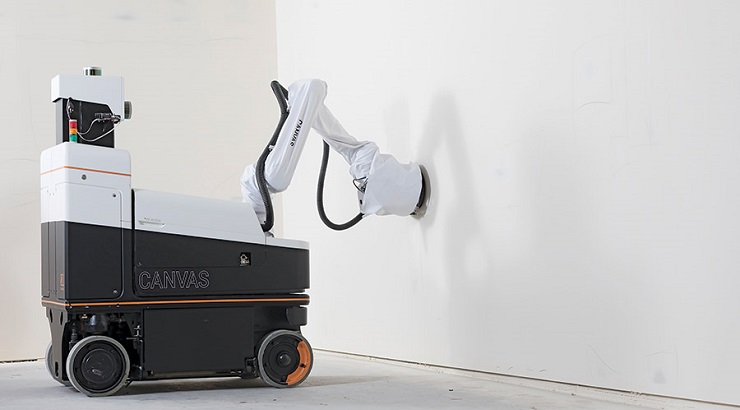Innovation
Drywall Finishing Robot That Perfectly Imitates Humans
Canvas robot can semi-autonomously finish large sections of drywall.

Drywall finishing is one of the most labor-intensive tasks in building construction requiring skilled craftworkers to get it right and achieve flawless results.
Unlike other trades in the industry where specialized tools and equipment have taken the strain out of work, drywall has remained unchanged for decades.
This is, however, changing thanks to a new solution by construction robotics company Canvas – whose drywall finishing robot can apply finishing compound and smooth out the drywall on its own.
Canvas drywall finishing robot
With the ability to semi-autonomously finish large sections of drywall, the canvas drywall finishing robot is transforming the way some drywall teams operate.
According to Canvas CEO Kevin Albert, the drywall robot focuses on broad spaces, high-volume sections, and hard-to-reach areas such as high spaces and corners.
RELATED: Concrete Finishing Robot Cuts Labor Costs by 30%
The robot’s telescoping mast allows its arm to reach heights of up to 17 ft.
“The machine can handle the application of the finishing compound and the sanding of it. Workers do the taping and handle the more complex geometries,” says Albert.
Imitate human expertise
Unlike most other robots that require programming knowledge or pre-loaded plans to function, the canvas drywall robot imitates human expertise to operate with minimal preparation.
It employs onboard visual sensors to identify the work area and then performs tasks assigned to it by the human operator.
“The robot uses its vision system and laser-scanning system to understand the geometry of the building, and the worker on the tablet can understand the workflow of the machine: where to spray, where to not, set the thickness,” Albert adds.
“It’s how we enable it to be incredibly flexible.”
RELATED: Building a House That Can Withstand Any Storm
Although the Canvas drywall robot has been operating in real construction sites for a few years now, the company introduced it to the market in early 2021 after securing a $24-million Series B funding round.
Drywall subcontractor
Previously, the company was running the robot with its workers, mostly working as a drywall subcontractor on the projects on which it was deployed.
Canvas now trains its clients to operate the robot regardless of skill level.
The training takes about five days to complete.
Lessons include how to safely operate the robot, how to direct it to scan the wall and create the workspaces, as well as troubleshooting.
The Canvas drywall finishing robot received top honors in the 2022 Pro Tools Innovation Awards – winning first place in the technology/robotics category.














